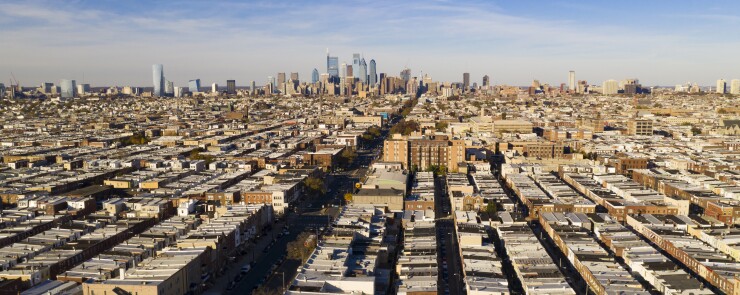Philadelphia officials announced the expansion of a program that will give first-time homebuyers and other eligible city residents up to $10,000 when they purchase a home in the city.
The revamped program, called Philly First Home, is expected to launch in June and aims to help make homeownership more affordable as the city sees its most robust building boom to date. The funds from the program can be used toward down payments and closing costs, officials said. Only Philadelphia residents who have lived in the city for three years are eligible.
Recipients can receive up to $10,000, or 6% of the purchase price of a home — whichever is less, provided in the form of a loan that will be forgiven if a resident stays in the home for at least 15 years. Applicants must be first-time home buyers or residents who have not owned a home for at least three years, have a household income at or below 120% of the area median income, and complete housing counseling at an agency funded by the Division of Housing and Community Development, which is launching the program.

According to the U.S. Department of Housing and Urban Development's guidelines, a single person making up to $75,720 would be eligible. A household with two would qualify with a combined income of $86,520. For a household of four, the income cutoff is $108,120.
The program's launch comes during a period of unprecedented change in Philadelphia, as younger and wealthier residents move into the city. The median sale price of a home has surged nearly 30% in the last five years, according to Zillow, jumping from $125,000 in March 2014 to $162,600 in March 2019, the latest data available.
Philadelphia's growth has highlighted massive inequities in the city, as the poverty rate hovers at about 26%, longtime residents fear being pushed out, and starter homes have become more difficult to find. Those problems have been exacerbated by a growing consumer debt crisis, including burdensome student loans, which has increasingly made home ownership out of reach for more Americans.
"We have to think about stabilizing our existing housing stock, and that means making sure that the pursuit of attaining the great American Dream ... is accessible," Councilwoman Cherelle Parker, who represents North Philadelphia neighborhoods, including West Oak Lane, said at a Thursday news conference.
Parker was joined by multiple members of City Council, including Council President Darrell Clarke, Councilwoman Maria Quinones-Sanchez, and Councilman Al Taubenberger, as well as members of Mayor Jim Kenney's administration, community organizations, and the real estate industry.
Beth McConnell, policy director for the Philadelphia Association of Community Development Corporations, in her remarks called the program "one critical way that Philadelphia is responding to gentrification ... [by] directing resources to people who could be hurt by that growth or pushed out."
Philadelphia has previously provided down payment assistance, including a current program that offers homebuyers grants of $1,000 through a partnership with JPMorgan Chase & Co. The launch of Philly First Home will expand that assistance to up to $10,000, with $3 million coming this year from the Housing Trust Fund.
Last year, after a proposed 1 percent tax on construction costs fell apart, Council members and Kenney instead agreed to contribute the real estate tax revenue from properties with expiring 10-year tax abatements to the city's Housing Trust Fund. Officials deposited $19 million into that fund earlier this year. Beyond the home ownership assistance program, money from the fund is expected to be used to expand affordable rental and home ownership opportunities.
With the $3 million contribution to the Philly First Home program, officials expect to assist roughly 300 households this year, said Anne Fadullon, the city's director of planning and development. She added that $2.5 million has been earmarked for next year.
The financial assistance provided by the program will become a second lien on the property, city officials said. If the home is sold or leased — or a resident refinances the first mortgage to take cash out of the property — within the first 15 years of ownership, the lien will become due and payable.
City officials said that the lien will be forgiven after 15 years of home ownership.




